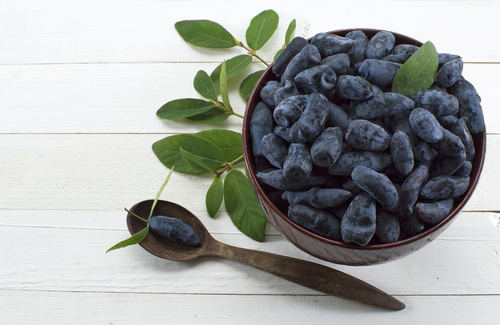Are Honey Berries Bad For You?
Also Known As: Lonicera caerulea, haskap
Short answer
Honeyberries are a very beneficial health food. They provide many antioxidants, vitamins, and minerals (as well as other nutrients) while imparting negligible amounts of fat and sodium.
Very healthy and numerous health benefits. A few harmful qualities may be associated, but only under certain circumstances such as an allergic reaction.
View Full Grading System
Category 'A'
Very healthy and numerous health benefits. Side effects are rare. Things rated an 'A+' are typically necessary for survival (for example, water).
Very healthy and numerous health benefits. A few harmful qualities may be associated, but only under certain circumstances such as an allergic reaction.
Very healthy and numerous health benefits. Harmful qualities may be associated, but aren't usually serious.
It is important to note that even the best things in life can become bad in immoderate amounts. So, although something may be rated an 'A+', overconsumption/overdoing can bring unwanted effects.
Category 'B'
Very beneficial to your health. Things rated a 'B+' may have a few harmful qualities to pay attention to.
Overall beneficial to your health. Things rated a 'B' may have some harmful qualities to pay attention to.
More beneficial to your health than not. However, harmful qualities are most likely associated and shouldn't be overlooked.
The main difference between category 'A' and category 'B' is the harmful qualities typically present in 'B' items. Serious side effects are usually uncommon, but are still possible and should be taken note of.
Category 'C'
Both beneficial and harmful qualities associated. Things rated a 'C+' are typically a bit more on the beneficial side. Still, moderation is important.
A fairly even ratio of beneficial and harmful qualities. Moderation is important. Very general topics that can lean towards both sides of the spectrum will be placed here as well. Rice, for example, can be good or bad depending on the type.
More harmful than beneficial. Side effects are common, especially when consumed/done excessively. Moderation is very important.
Category 'C' usually denotes to both good and bad qualities. When it comes to this category, it is important to keep this word in mind: moderation.
Category 'D'
Harmful to your health. Although benefits may be associated, the bad most likely outweighs the good. Moderation is very important.
Harmful to your health. A few benefits may be associated, but the bad outweighs the good. Moderation is extremely important.
Harmful to your health. Very few, if any, benefits are present. Things in this category should be avoided as much as possible.
Category 'D' is typically for things that are more harmful than beneficial. While consuming/doing something unhealthy once in a blue moon shouldn't hurt, we definitely recommend eliminating 'D' items as a regular part of your routine/diet.
Category 'F'
Category 'F' is for things that fail to bring anything beneficial to the table, and are very harmful to your health. We recommend completely avoiding anything in this category. Long-term side effects of 'F' items are usually very serious.
Category 'N'
'N' stands for neutral. Things placed into this category are generally (a) neither good nor bad for you, or (b) lack the necessary evidence to reach any conclusions.
Long answer
Honeyberries provide a wide source of valuable nutrition. More popular in the UK than in the US, honeyberries grow on sturdy bushes that can be planted in a wide range of soils, being able to grow in a pH value between 4.5 and 8.5. These seemingly elongated blueberries (they are not blueberries!) contain high levels of antioxidants - in fact, even more than blueberries. They are second, only to pomegranates, in the amount of potassium they carry, with 190 g per 100 g (or 2/3 cup). Potassium is important in maintaining the body's acid-base balance, converting carbohydrates into energy, regulating sodium, etc. Also found in abundant quantities within honeyberries are vitamin C (more than in an orange), thiamine, and manganese. Other vitamins and minerals present include magnesium and phosphorous, as well as riboflavin, and pyridoxine (vitamin B6).
The antioxidants contained in honeyberries help prevent and fight against various types of cancer. One compound honeyberries have particularly high amounts of is anthocyanin. Anthocyanins help protect the eyes, inhibit colon cancer cells, and heal varicose veins.
Anthocyanins work well with the high amount of dietary fiber (27% per 2/3 cup) in helping to promote a healthy colon. Also known by its Japanese name of haskap, honeyberries provide a wide range of health benefits from keeping the body systems working regularly to preventing the onset of several forms of cancer.

Benefits
- great source of antioxidants, vitamins, and minerals
-
reduces risk of cancer
-
anti-inflammatory effects
-
promotes eye health
Please turn your Ad Blocker off to see this content. Thank you!
Thank you for your feedback!
Written by Jeff Volling
Published on: 01-07-2016
Last updated: 12-10-2016
Thank you for your feedback!
Written by Jeff Volling
Published on: 01-07-2016
Last updated: 12-10-2016


 Approved by
Approved by 





.png)






.png)

